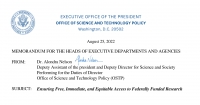The Office of Science and Technology Policy (OSTP) of the Executive Office of the President of the United States has issued updated guidelines in the revised memorandum, directing public institutions to include provisions for immediate and cost-free public access to the publication of research findings. The first such memorandum, titled "Increasing Access to the Results of Federally Funded Scientific Research," was issued in 2013 and urged American public institutions to develop policies that ensure public access to research funded by the government. According to the memorandum known as the "Holdren Memorandum" (named after the then-director of OSTP, John Holdren), all public institutions with annual research and development budgets exceeding $100 million were directed to develop a plan to support public access to federally funded research results, particularly scientific publications and the digital data resulting from them, with the option of delaying publication for up to 12 months. According to the 2021 Report on Public Access, all legally binding public institutions have developed and implemented plans and policies in line with these guidelines. Their researchers are required to provide access to the full text of their articles no later than 12 months after publication and to develop data management plans in new research projects that will be made available to other scientists and the public to the fullest extent possible[1]. The American public benefits greatly from this development, as the Holdren Memorandum paved the way for a scientific community culture that values collaboration and data sharing.
The success of the first memorandum demonstrated that adaptation could lead to increased data availability and accessibility of research results from all publicly funded institutions. The primary limitation of the Holdren Memorandum was the 12-month publication delay in public access, limiting access to subscribed users and those with privileged access through libraries or other institutions.
Nine years later, the updated memorandum titled "Ensuring Free, Immediate, and Equitable Access to Federally Funded Research" provides guidelines for ensuring public access to research by all public institutions involved in providing/receiving support for research projects, without any time delay after publication. The difference between the newer memorandum and institutions with annual budgets exceeding $100 million and others is that the former need to provide documentation of their new policy within 180 days, while the latter have 360 days. The newer "Nelson Memorandum" (named after the current head of OSTP, Alondra Nelson) applies to all publications and research results whose authors or co-authors have worked on research funded by the government, whether they are journal articles, book chapters, introductions, or conference proceedings. The guidelines also call for immediate public access to scientific data resulting from government-funded research at the time of publication of the scientific publication it's based on, unless subject to limitations outlined in the memorandum or classified data. It's noted that scientists need to be allowed to include costs related to data handling, storage, and management as allowable costs within the research project budget. The guidelines also recommend collecting and providing access to appropriate metadata for scientific publications and data resulting from publicly funded research, as far as possible at the time of repository storage. Metadata should include the names of all authors and co-authors, their affiliations, funding sources, publication date, and a unique permanent digital identifier. Institutions are required to adapt and publish adapted policies by the end of 2024, with the date of entry into force no later than one year after its publication.
Compared to the previous version, the updated memorandum adopts a more recommendatory tone instead of mandating institutions to adjust their policies regarding access to scientific research. Additionally, the term "open access" is replaced with "public access," which signifies freedom to read and download the text, but not to use it for other purposes without restrictions, and the version of the article that should be available in public access - the author's accepted manuscript or the published version of record - is not specified. Publishers will determine which licenses for reuse will be conditional and which version of the article will be stored in the repository. Such questions and others still remain unanswered with the publication of the Nelson Memorandum, but it certainly represents a step in the right direction for the open science initiative in the United States.
In their public message, the White House emphasizes that financial resources and privileged access should never be prerequisites for the use of publicly funded research. They believe that changes in practice that emerged during the COVID-19 pandemic demonstrate the benefit of direct public access to research publications and data, which can greatly contribute to the quality of life, the advancement of scientific discoveries, and the promotion of fairness at all levels of society.
[1] The Congressional report on public access from 2021 provides the latest information on the efforts of these departments and institutions to increase public access to publications and other research results and to improve the management and sharing of research data.
Sources:
Anderson, R. (2022) A New OSTP Memo: Some Initial Observations and Questions / The Scholarly Kitchen. URL: https://scholarlykitchen.sspnet.org/2022/08/29/a-new-ostp-memo-some-initial-observations-and-questions/
Clarke & Esposito (2022) Zero Embargo / The Brief. URL: https://www.ce-strategy.com/the-brief/zero-embargo/
OSTP Public Access Congressional Report 2021. URL: https://www.whitehouse.gov/wp-content/uploads/2022/02/2021-Public-Access-Congressional-Report_OSTP.pdf
Nelson, A. (2022) Memorandum for the heads of executive departments and agencies: Ensuring Free, Immediate, and Equitable Access to Federally Funded Research. URL: https://www.whitehouse.gov/wp-content/uploads/2022/08/08-2022-OSTP-Public-Access-Memo.pdf

